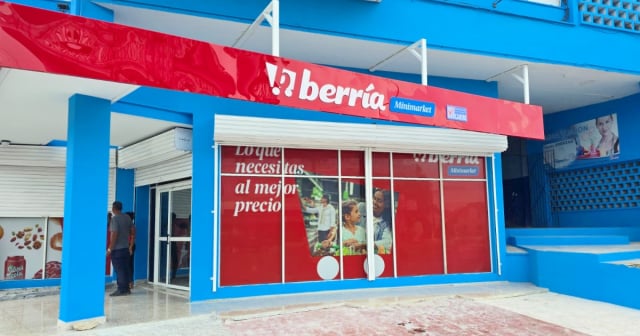The Cuban YouTuber known for his channel JSant TV visited Amistad 26, the newly opened market in Freely Convertible Currency (MLC) located in the Plaza de la Revolución municipality.
Determined to explore the prices and ready to spend the 3.30 MLC available on his card, the YouTuber didn't have much luck during his browsing.
On the first day, they slammed the door in his face because the power went out and they closed the place; on the second day, after a tiring wait that tested his patience, he managed to get inside, but to his surprise, the power went out again while he was there.
However, this time they did not close due to the blackout; instead, they chose to inform customers that they needed to pay through Transfermóvil, the mobile application from ETECSA that allows various banking, commercial, and telecommunications transactions from a mobile device in Cuba.
In the midst of a blackout inside the store, JSant TV explored a variety of products and prices. Pasta, beans, tomato puree, cheese, flour, salt, sugar, and other items were available, but most of them were quite expensive.
At first glance, the store appeared to have a wider selection than others of its kind, but the prices remain unaffordable, with Spanish products priced significantly higher than what they are sold for in the Iberian Peninsula.
The YouTuber and his companion were particularly surprised by a kilogram of rice priced at $7.60, which translates to about 2,014 pesos when we assess the MLC at 265 CUP, the stable rate in the informal market.
"This is rice with gold inlays," the communicator remarked with irony.
It turns out that the rice in question is Dacsa, a well-known and certainly not inexpensive Spanish rice brand, with a designation of origin from Valencia, specializing in the production of high-quality varieties, crafted selection, and particularly used in traditional dishes like paella.
It is truly abusive to present to Cuban customers—who consider rice a staple food—rice with such characteristics and at such a price.
It is possible that there were other prices, or perhaps the cheaper ones had sold out, but the mere fact of selling a kilogram of rice in a market in Cuba for 7.60 MLC borders on immorality.
During his journey, JSant explored and compared the prices of products available in the store with their value on the black market.
In the end, the YouTuber couldn't buy anything because, since he had an iPhone—which doesn’t allow the installation of Transfermóvil—he had no way to spend his 3.30 MLC.
"'What you need at the best price'... This slogan is incorrect, sir; it is false," he concluded as he left the store, standing in front of the window that was promoting a shameful tagline as if it were true.
In the comments section of the video, dozens of internet users expressed their outrage over the prices, which were higher than those in Spanish supermarkets.
"The slogan should say 'The best prices for those who have relatives in Miami,'" a commentator remarked with irony.
Store with Basque supplier
The Amistad 26 Market, located at the intersection of Avenue 26 and Zapata, is the result of a collaboration between the Caribbean Stores Chain and the Basque supplier Aldaketa.
During the reopening event, the store team committed to providing quality service, while the supplier stated that they would work on improving product selection and prices to meet the needs of the community.
However, this type of announcement cannot disguise an obvious reality: a large part of the Cuban population does not have access to freely convertible currency (MLC), which automatically excludes them from being able to shop in these establishments.
The empty promise of Díaz-Canel in 2020 feels distant now, when he explained the role of MLC stores as a necessity to supply stores in national currency.
Stores in freely convertible currency (MLC) emerged in Cuba in 2019 as an economic measure by the government to capture foreign currency amid a growing economic crisis and a severe shortage of basic goods.
However, over time, these stores have become a source of social inequality, as many Cubans do not have direct access to foreign currency, relying on remittances or the informal market to make purchases there.
Filed under:
